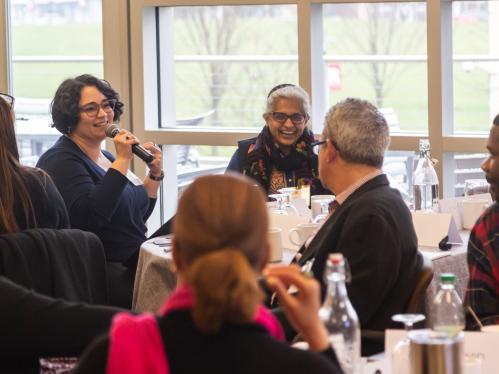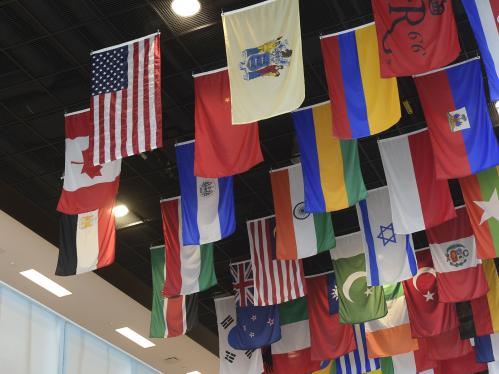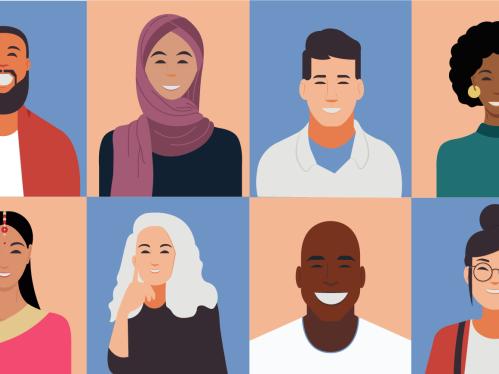
Mentoring Across Difference
Why does attention to differences matter in a mentoring partnership?
We all have our own identities in a variety of domains: race, ethnicity, gender identity, sexual orientation, and so on. These identities not only shape who we are but the experiences we've had – good and bad – as a result. Attending to differences is necessary to acknowledge and respect the impact they may have on a mentoring partnership. It offers an opportunity to use the differences as a catalyst to become more informed, respectful, and open when it comes to identities that are different from your own.

Rutgers University is one of the most diverse academic institutions in the nation.
What is Culturally Aware Mentoring (CAM)?
Culturally Aware Mentoring involves an ongoing, intentional, and mutually enriching relationship with someone of a different race, gender, ethnicity, religion, cultural background, socioeconomic background, sexual orientation, or nationality. At its best, this relationship is built on a foundation of what Betty Neal Crutcher calls “the three Vs”: values, virtues, and vision. The identification of values that are held in common, even across difference, leads to the development of trust and understanding. The cultivation of virtues—the abilities and ways of knowing that enable one to deal with various personalities, cultures, and experiences—enables one to maintain individual and institutional boundaries and to overcome barriers between people. The commitment to a vision of inclusive excellence inspires one to clear educational pathways and help others overcome obstacles and limitations.

Tools You Can Use
-
The Faculty Diversity Collaboratives staff are trained by CIMER to lead trainings on Culturally Aware Mentoring. Units and departments interested in building capacity for mentoring across difference may contact the FDC for consultation or to request a workshop.
-
- Be aware of your own assumptions. In the same way that others may have different points of view because of differences in their life experiences, you likely have been shaped by your gender, race, social class, education, generation, geography, and a multitude of other cultural influences. Increasing your awareness of the ways you are a product of your past can help you avoid assuming that others see the world in the same way.
- Get curious about your colleagues' different life experiences. Putting yourself in other people’s shoes and seeking to understand how they may have come to their different points of view is a critical step in building a mentoring relationship.
- Address differences openly. Relationships in which it becomes comfortable to talk about and acknowledge differences have much greater potential value for both the mentor and mentee. While it may initially feel uncomfortable to talk about topics such as race, gender, and/or socioeconomic background, the potential for increased understanding and connection makes it worth the risk
-
Other recommendations, for mentors specifically, include:
- Remember that everyone brings their own cultural lens and experiences into the relationship – including you! This reality can provide both challenges and opportunities within the relationship.
- Be aware that we all enter into relationships across differences with information and misinformation about differences – much of which is grounded in stereotypes, assumptions, prejudice, and fear.
- Make a commitment to more fully recognize, understand, and appreciate differences and the impact of differences in your mentoring relationship.
- Notice power imbalances and commit to understanding how power and privilege impact your mentoring relationship. Explore how to be an ally to support an authentic relationship across differences.
-
- Cross-Cultural Mentoring: A Pathway to Making Excellence Inclusive (2014) by Betty Neal Crutcher
- Mentoring Across Differences (2018) by Nora Yusuf Osman and Barbara Gottlieb
- Tapping the Wisdom Tradition: Essential Elements to Mentoring Students of Color (2009) by Alvin Alvarez
- Black S., Byars-Winston A, Cabrera I., Pfund C. Enhancing Research Mentors' Cultural Awareness in STEM: A Mentor Training Intervention. UI J. 2022 Spring; 13(1):36522. Epub 2022 May 2. PMID: 37079705; PMCID: PMC10112533.
- Byars-Winston, A., Leverett, P., Benbow, R. J., Pfund, C., Thayer-Hart, N. & Branchaw, J. (2020). Race and Ethnicity in Biology Research Mentoring Relationships Journal of Diversity in Higher Education, 13 (3), 240-253. doi: 10.1037/dhe0000106.
-
- Bridging Differences for Better Mentoring by Lisa Z. Fain and Lois J. Zachary
- Forbes: 11 Books To Read If You Want To Be A More Inclusive Leader
-
Watch the video below.
Get Involved
Need a mentor or looking for a mentorship opportunity? Check out the Rutgers Connection Network (RCN) Mentoring Program.
